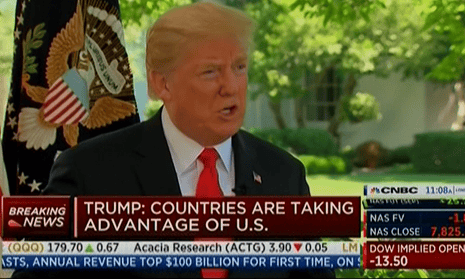The war of words over Donald Trump’s threat to impose wide-ranging tariffs on imports from China and the European Union has intensified after the German chancellor, Angela Merkel, said the levies threatened the incomes of workers across the world.
On Friday, Merkel described possible US tariffs on imported cars as a breach of World Trade Organization rules and “a real threat to the prosperity of many in the world” as Trump went on US television to say that he was ready to expand his roster of tariffs on Beijing to $500bn, covering almost every product imported to the US from China.
Earlier, Trump said on Twitter that the US “should be allowed to recapture what was lost due to illegal currency manipulation and bad trade deals”.
....The United States should not be penalized because we are doing so well. Tightening now hurts all that we have done. The U.S. should be allowed to recapture what was lost due to illegal currency manipulation and BAD Trade Deals. Debt coming due & we are raising rates - Really?
— Donald J. Trump (@realDonaldTrump) July 20, 2018
Stock markets slipped back on the news, with the German Dax the worst hit. The Frankfurt-based index tumbled 144 points, or 1.1% to 12,542. The FTSE 100 dropped almost 60 points in response to the tit-for-tat battle before ending the day down just 5 points at 7,678.
The dollar index, a measure of its value against a basket of other major currencies, was down 0.6% after it reached a one year high on Thursday.
For several months the Trump administration has ramped up its campaign to force rival economies to end what it believes are artificial subsidies and restrictive practices that deny US firms access to their markets. Trump has also been angered by central bank policies he says keep rival currencies low compared with the dollar, making US exports expensive.
In his attempts to promote a more favourable exchange rate, Trump rounded on the US central bank, the Federal Resrve, for pressing ahead with interest rate hikes, thereby making the US a more popular destination for global savings and pushing up the value of the dollar.
Merkel accepted during her annual summer news conference in Berlin that Trump’s regular jibes at Germany “certainly have something to do with our economic size”.
“I try to address the criticism but also to provide an independent, confident answer, and this doesn’t always match the view held by the American president,” she said.
She added that Trump’s complaint that Berlin is exploiting the US when it comes to trade was misplaced. Merkel said that narrative only takes into account the trade in goods and that the trade in services and repatriation of profits to the US from Europe favoured the US to an even greater extent.
The German chancellor also pointed out that BMW’s largest car factory was not in Germany but in Spartanburg, South Carolina and employs 8,800 workers.
Last week, Washington listed $200bn (£150bn) worth of additional Chinese products it intends to place tariffs on as soon as September. The list named more than 6,000 items, including food products, minerals and consumer goods such as handbags, which would become subject to a 10% tariff.
Trump has threatened to add another $300bn of products to the list, but his intervention on Friday was his most explicit threat so far.
The European commission, the EU’s executive arm, has already warned the White House it would be prepared to use tariffs against as much as $300bnof US products should Trump slap higher taxes on European automotive imports to the US.
The president threatened last month to impose tariffs of 20% on imports of cars from the EU after Brussels carried through plans to tax US consumer goods – such as whiskey, cigars and Harley-Davidson motorcycles – in retaliation against US tariffs on European steel and aluminium.
Oliver Jones at Capital Economics said investors would flee stock markets in Asia and Europe if Trump pressed ahead with his tariff threats. “The retaliation by other countries to US protectionism so far has mostly been aimed at US farmers, not US multinationals. But that could change. In particular, we suspect that China will start to target US multinationals operating in China directly rather than imposing more tariffs of its own.”
Chris Beauchamp, chief market analyst at IG, said: “Having come away from the Nato summit with an apparent win using his strong-arm negotiating tactics, this move appears designed to bring the Chinese to the table.”
